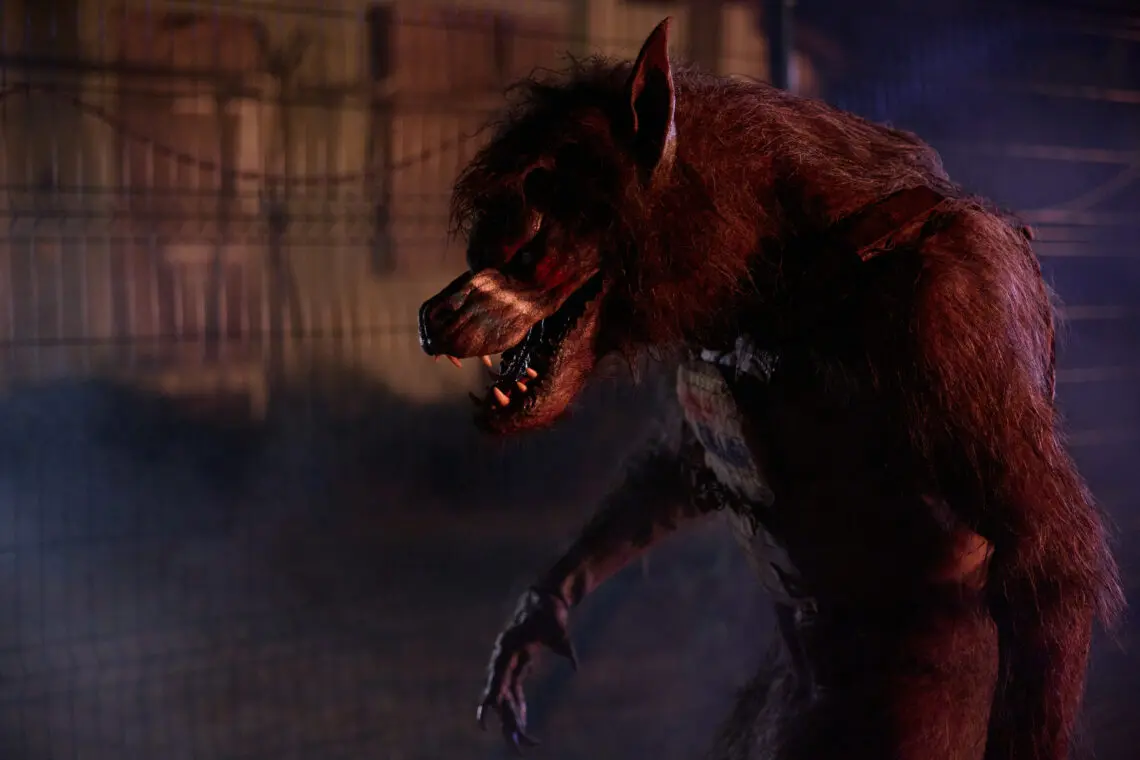“Werewolves” is your basic, everyday lean-and-mean dystopian werewolf-as-zombie action thriller, with elements lifted from the pandemic and the “Purge” films. It’s not a good movie, but it’s a tight little time passer. Frank Grillo, who’s at the center of it (playing a ripped bruiser who is also…a molecular biologist!), has a way of making any pulp movie better. He’s like a brainy Charles Bronson. And the plot is simplicity itself, and efficiency too: On the night of a supermoon (that’s when the full moon comes closest to Earth), people all over the globe are transformed into towering werewolves if they look at the moon for so much as one second. Talk about a good reason to stay home and stream something.
How are the werewolves? Cheesy in a fun way. As in self-consciously old-fashioned, or maybe just lavishly threadbare. A lot of people now look upon “practical” effects with a touch of nostalgic awe, though there was a time when the latest wave of practical-effects technology actually felt as cutting edge as digital. That’s because a lot of those effects were marvelously impractical.
Popular on Variety No genre reveals that more than the werewolf film. “The Wolfman,” in 1941, stopped dead in its tracks during each transformation scene, as if to say, “Forget the dumb story! Behold this!” This being the face of Lon Chaney Jr. contorting itself in agony as more and more layers of hair appeared upon it, thanks to the magic of dissolves. “The Howling,” in 1981, announced a new age of visual effects — those stretching jaws and elongated limbs marked the first big splash of Rob Bottin, the next-level effects maestro who went on to design the creatures for John Carpenter’s “The Thing.” And in “An American Werewolf in London,” when David Naughton stared at his mutating hand, practical effects, at that moment, wanted to be digital.
But watching “Werewolves,” you look at the title creatures and think, “Are visual effects now devolving?” The monsters are tall and impressively athletic-looking, with devil ears and animatronic snouts that snap like miniature crocodile jaws. These beasts move rapidly and tear a great deal of flesh. But as designed by Alex Gillis and Tom Woodruff Jr., they also look like they’re made of papier-mâché with pasted-on costume hair. From some angles, they look how I’d imagine the wolf would look in a version of “Little Red Riding Hood” made by the “Winnie the Pooh: Blood and Honey” people.
Grllo’s Dr. Wesley Marshall works for the CDC, which is studying the werewolf phenomenon and trying to devise an antidote for it, a substance called “moonscreen” that you apply by (yes!) spraying it on. There are human guinea pigs on hand, who look at the moon and transform, and naturally the experiment goes haywire. But the whole panic-in-the-lab “scientific” backdrop recedes as quickly as it’s introduced.
Wesley, the caretaker of his late brother’s wife (Ilfenesh Hadera) and daughter (Kamdynn Gary), winds up on the run with his colleague (Katrina Law), as “Werewolves” takes the direct form of a zombie movie: Who will be the next to turn werewolf? Slats nailed over windows to keep the monsters from coming in. And so forth. One of the werewolves is Wesley’s neighbor, a survivalist blowhard who prepares for supermoon night by painting his face with red, white, and blue warpaint. He then transforms into what looks like the first Jan. 6 werewolf (unless you count the QAnon Shaman).
The movie was directed by Steven C. Miller, who has one of those super-niche indie-B-movie cult followings; they prize his intermittent action ingenuity combined with his lack of pretension. But Miller isn’t exactly big on subtext. “Werewolves” has one of the most bombastic man-at-a-synthesizer-conjuring-aural-clouds-of-doom musical scores I’ve ever heard. The best part of the movie is the end, when Grillo himself has to look into the moon to save his loved ones. Lon Chaney Jr. would howl his approval.

 Italian
Italian







